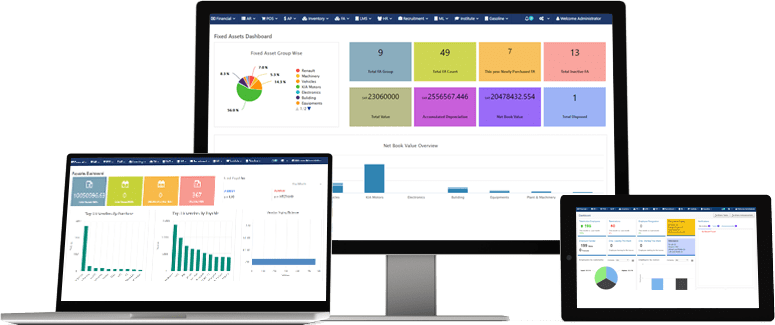ERP stands for Enterprise Resource Planning
The hype is real. The noise is great. The word ERP has been mostly heard in business arenas of today. But before going deeper into the discussions we should be able to know what this term refers to.
ERP refers to Enterprise Resource Planning. What is this planning all about? ERP and business are made for each other. Starting from the planning of your business, looking for potential angles, and finally the execution of your plans, everything falls in the domain of enterprise resource planning.
Name a department of your business and ERP will take care of it. It could be finance, accounting, HR, CRM, inventory, and supply chain management. Everything is effectively managed with great expertise.
However, these are considered basic features and are commonly offered by many software companies. The trend is now changing. Developers are introducing even more latest technologies like artificial intelligence in their software to increase the efficiency and proficiency of your business.
Offered Features? What does SolutionDot offer in this regard?

Increased Productivity
SDSuite ERP helps in increasing the productivity of your business by using minimum resources. Everything is presented in the shape of streamlined reporting. You can focus completely on the growth of your business without bothering much about extra management affairs.

Reduced Risks
Every process is made transparent. The software we are talking about is secure & reliable and leaves no stone unturned to ensure a clear reduction in the risk percentage. You can now make sure that the business complies with the regulatory requirements.

Accelerated Reporting
ERP helps in increasing the productivity of your business by using minimum resources. Everything is presented in the shape of streamlined reporting. You can focus completely on the growth of your business without bothering much about extra management affairs.

Simpler IT
Every process is made transparent. The software we are talking about is secure & reliable and leaves no stone unturned to ensure a clear reduction in the risk percentage. You can now make sure that the business complies with the regulatory requirements.

Better Insights
The whole mechanism is so quick and effective that you get enough time to forecast your future strategies. The data is managed in real-time operations are made efficient and you can give full attention to your future business plans.
How Does an ERP System Work?
ERP is a suite of interconnected applications designed to optimize business operations. These applications, connected through an integrated system, work together to deliver positive results for the organization. Core modules like finance, HR, and inventory are fundamental to any ERP system. However, its real strength lies in its ability to be customized to meet the organization’s particular needs. This flexibility ensures that the ERP adapts as the company grows and evolves, keeping pace with changing business requirements.

Types of ERP
The implementations of ERP differ in terms of their working and managing mechanisms. Generally, so far, three distinct types have been identified.

Cloud ERP
Cloud-based ERP systems offer significant advantages for users, leveraging the latest technology to meet modern business needs. Cloud ERP offers a modern alternative to traditional on-premise systems by being hosted online. This reduces initial setup costs and provides easier access via internet connectivity. The cloud model also boosts security, flexibility, and scalability, making it a more adaptable and efficient solution for businesses seeking growth and streamlined operations.

On-Premise ERP
The main difference lies in the way these software are deployed. Unlike the cloud method which is hosted on the vendor’s servers, the on-premise ERP is installed on your computers and servers locally. You have to update such systems yourself and it might require some extra time.

Hybrid ERP
What could be better than combining the strengths of both options? Hybrid ERP offers the best of both worlds, merging on-premise capabilities with cloud-based flexibility. This allows businesses to benefit from the advantages of both systems in a single, integrated solution. The implementations are quick, vendor independence is enhanced and the time of maintaining cycles is reduced.
SolutionDot identified the factors that reflect that you need an ERP to take care of your business.
1-You are spending far too much time on your business tasks. The time required to complete all the management activities is reduced to a larger extent. The ERP offers a simple interface for the users and integrates the whole system under a single database.
2-Managing a large workforce and meeting payroll demands can be challenging. An advanced system can streamline operations, handling the management of numerous employees efficiently. This could lessen the necessity for certain roles, enabling you to reassign staff to different responsibilities rather than reducing headcount.
3-You are missing out on the opportunities to keep pace with the fast market trends. Give less time to your daily routine work that can be handled quite efficiently by the software and you can focus on your future business planning with a burden-less mind.
Are there any size limitations?

Small Business ERP
If your company has around 250 employees, you must be considering a small business ERP as usually the systems have a lot of variations in price range as far as the size of the ERP is concerned. Cover every angle of your developing company.

Midsize Business ERP
If you have to handle around 500 employees, then a mid sized business ERP would be best for you. The built-in analytics, easy deployment, and handling of all the department operations efficiently is done here.

Enterprise ERP
The company having greater staff than 500, this would fall into a global domain as such companies would need a large Enterprise ERP. It is designed for large companies which work on a higher level.









 Saudi Arabia (English)
Saudi Arabia (English) United Kingdom
United Kingdom Global Site
Global Site